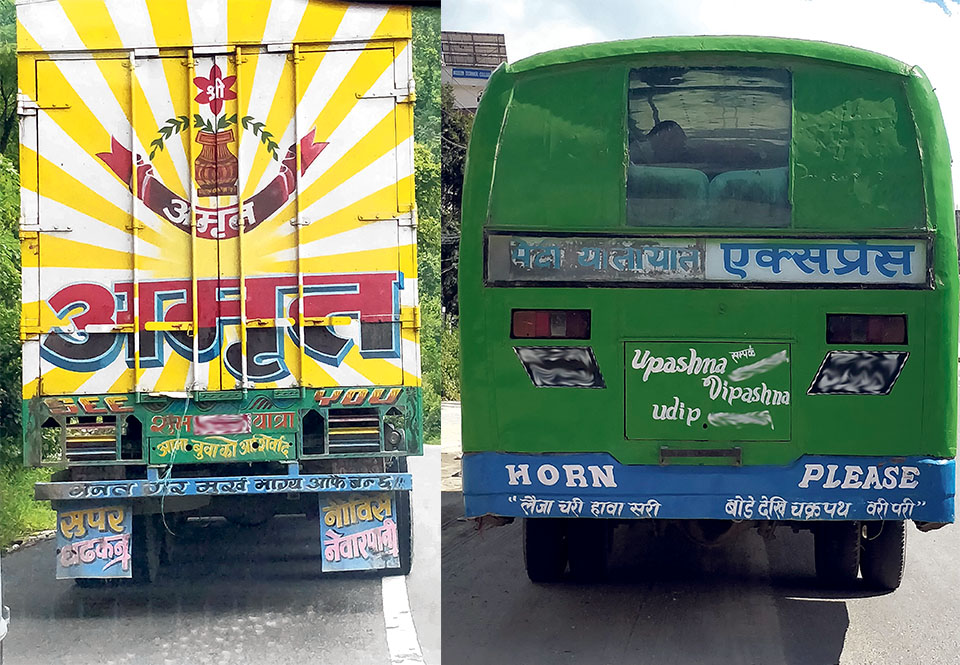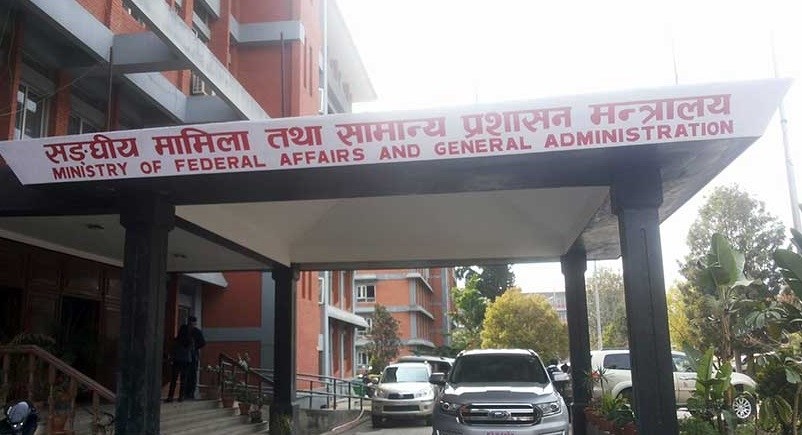
OR

All of us come across various poems and satires of all kinds – on life, love, and heartbreaks – written at the back of jeeps and trucks on a fairly regular basis. Most of the times, they make us laugh for a minute or two and keep our commute interesting, and then we forget all about it. The most we might do is share a few lines we remember with friends. However, Abhushan Gautam sees these lines as pieces of literature that need to be documented lest they be forgotten as just random ramblings.
Gautam is the man behind the popular page “Literature on Wheels” which is a visual documentation of literature written on all kinds of vehicles. Gautam started Literature on Wheels in 2013, from Facebook, and he is as actively involved with it today as he was back then. “I have always found things written on buses and trucks interesting and wanted to document them,” he says.
In the past, when Gautam used to work in the field of media, he was required to travel a lot. “I used to travel long distances on my bike and that’s when I started noticing these poems and writings at the back of trucks and buses,” he reveals. According to him, when he got talking with some bus drivers, he found out that, like him, they too had to travel alone for long distances and for many of them their vehicles were their second home. “As the vehicles were a big part of their lives, they chose to make it a medium for self-expression,” explains Gautam.
Thanks to his interest in these writings, he made friends with several drivers while on the road. He recalls a driver he met at Sindhuli telling him the story of how these poems and quotes got added to the vehicles. “This particular driver told me that they had special vehicle painting stores where you could go and have the quote of your choice painted on your bus or truck,” explains Gautam adding that the driver also told him that this writing culture was the norm among drivers in Nepal. Everybody who drives a bus or a truck wants to personalize his vehicle and he does that with a quote that resonates with him the most.
Moreover, according to Gautam, the charm of these quotes lies in their variations as well as their creativity.
“Some provide information, some talk about the meaning of life while others are about someone they love. And sometimes, they are so well-rhymed or well-written that it feels like an excerpt from an actual poem,” he says.
Gautam confesses that he finds these words written at the back of vehicles as artistic as a painting or photograph that’s displayed in a fancy gallery.
However, it’s impossible to ignore the fact that sometimes these quotes tend to be a little out of line and sometimes downright sexist, especially against women. Also, it does not help that most truck and tipper drivers are men. “These quotes found in some vehicles are a by-product of the deeply-rooted toxicity in our culture,” says Gautam adding that he reckons the only way to get rid of them is by changing people’s way of thinking. But in his case, he tends to root out such writings (about 40% of writings are like that) and documents only those with poetic or informative value.
Gautam has also been able to build a community with other people who are documenting vehicle literature in countries like India and Vietnam. “A friend from Bangladesh took inspiration from my work here in Nepal and started doing the same in Bangladesh,” he says.
Thanks to this peculiar hobby of his, he is always on the lookout for such pieces of writings and literature on vehicles. It helps that the followers of his page also send him pictures of vehicle literature that they find. “This has added new excitement to my travels as I hope to catch a glimpse of a new poem or haiku plastered on a vehicle whenever possible,” he says.
Gautam reveals that poems or quotes on love and satire are the ones that are most popular among his followers. “The posts with quotes that include recent pop-culture references (like a popular song or a famous line from a celebrity) are the ones that receive the most likes and shares,” he says. He further explains that just like music and art, vehicle literature also flourishes because of its relevance.
He hopes that these writings continue to remain relevant and present in the future as well. “If it becomes obsolete, I want to keep them archived and well documented so we can look back at them in the future,” he explains. Someday, he also hopes to exhibit his collection and make a documentary about it as well. “I think it’s important to preserve these pieces of writings as they are nothing short of a contemporary form of art,” he concludes.
You May Like This

UML leader Basnet to Balen: Don't be pampered just because you have a few hundred fans on Facebook
KATHMANDU, August 26: While the Mayor of Kathmandu Metropolitan City (KMC), Balendra Shah, is speeding up the work to demolish... Read More...

Complete education, full health could double Nepal's GDP per capita: WB
KATHMANDU, June 7: Nepal has the potential to double its Gross Domestic Product (GDP) per capita in the long run if... Read More...

Smugglers’ go-downs near customs office
SIRAHA, March 16: On March 10, a team from the District Police Office (DPO), Siraha, arrested a truck with an... Read More...







Just In
- ADB Vice-President Yang pays courtesy call on PM Dahal
- PM Dahal, Chairman of CIDCA Zhaohui hold meeting
- MoFAGA transfers 8 under secretaries and 11 section officers (with list)
- PM Dahal arrives in Morang
- DDC pays Rs 480 million dues to farmers
- Police arrest seven Indian nationals with 1.5 kg gold and Rs 14.3 million cash
- Gold price increases by Rs 1,400 today
- Kathmandu continues to top the chart of world’s most polluted city










Leave A Comment